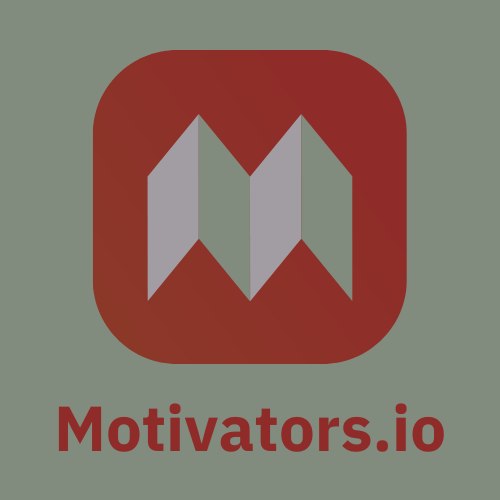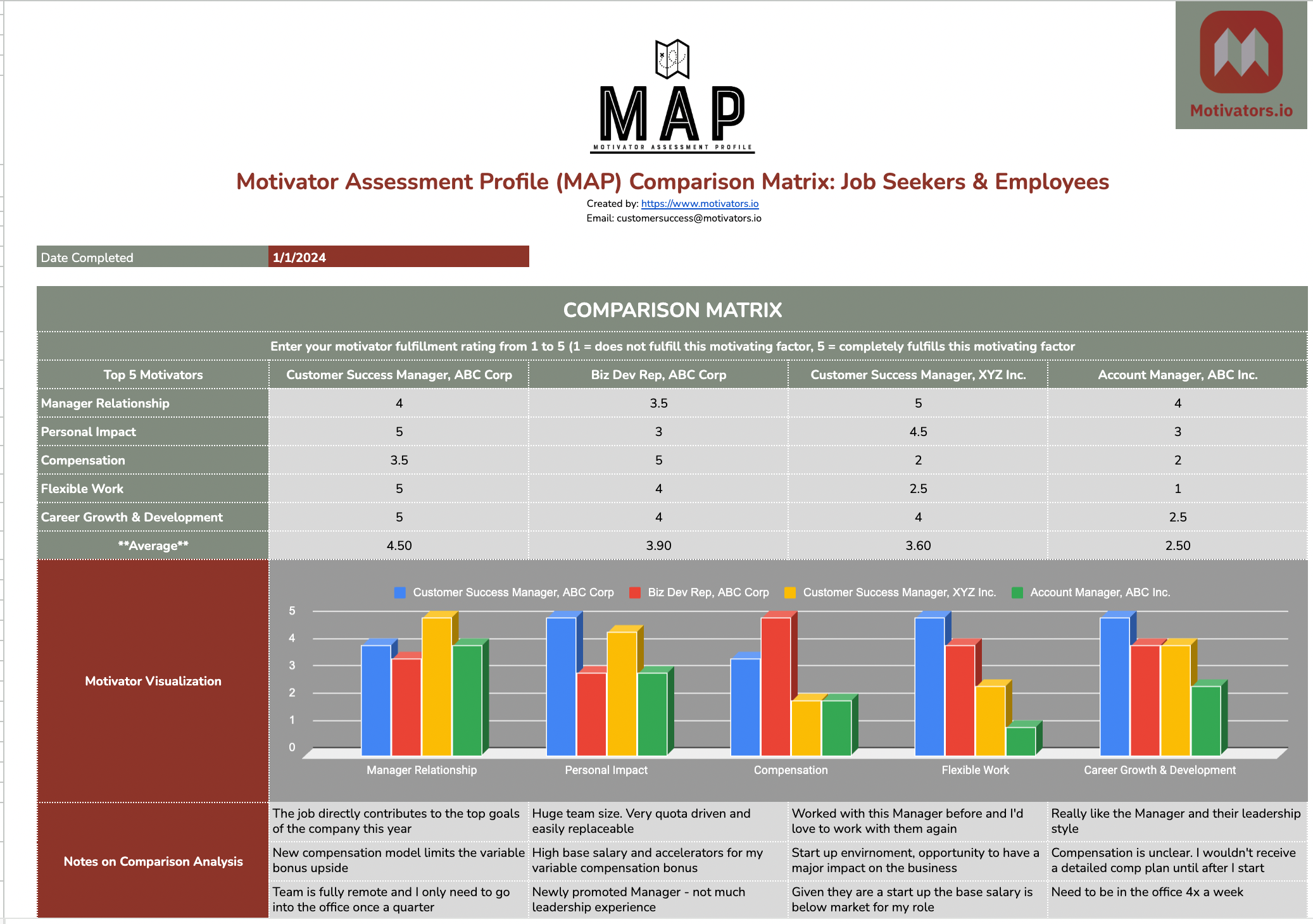Fulfill Your Top Motivators at Every Stage of Your Career
-

1. Create Your Personalized MAP
Your journey begins with an assessment to identify your most important motivators. The assessment takes about 10-15 minutes to complete.
-

2. Self Reflection and Prioritization
Your personalized MAP Guidebook includes extensive career development resources to help you prioritize and fulfill your top motivators.
-

3. Conversations and Action Plans
Evaluate jobs or companies against your top motivators, or create a MAP development plan in partnership with your Manager.
The Assessment
A map helps you to identify where you are and where you want to go; our MAP identifies the starting point and navigation steps on your journey to a fulfilling career.
Assessment Process:
The Motivator Assessment Profile (MAP) is a 66-question assessment to identify and prioritize your top motivating factors at work. The assessment takes approximately 10-15 minutes to complete.
Assessment User Experience:
The Motivator Assessment Profile (MAP) has an assessment satisfaction rating of 4.8 out of 5 stars from 320+ reviews on the CloudResearch survey platform.
Assessment Validity:
The Motivator Assessment Profile (MAP) was developed and validated through a research process led by Industrial/Organizational (I/O) Psychology and Behavioral Science teams.
This process adhered to the style guides for psychometric assessment and evaluation set forth by the British Psychological Society (BPS) and the American Psychological Association (APA), ensuring that the assessment tool conforms to rigorous scientific standards and principles.
Validated by I/O Psychologists and backed by research on employee motivation, the Motivator Assessment Profile (MAP) analyzes 12 factors that influence decisions to join, stay with, or leave a company:
-
The sentiment that you're being "taken care of" at work.
Examples include investments in your mental and physical health, wellness, retirement plan, or feeling recognized and appreciated for your work. -
The opportunity to create and implement new ideas at work.
Examples include building new and different things, reevaluating current processes, and working with emerging technologies.
-
The opportunities to grow your career within your current or target role.
Examples include learning and developing new skills in your current role, or building the skills that will elevate your influence, impact, and likelihood of being promoted into your next role.
-
Your satisfaction with the monetary components of your job.
Examples include your base salary, individual or company bonuses, or long-term incentives in the form of stock options or equity awards.
-
The collection of values, beliefs, and practices that inform the expected behaviors and actions at work.
Examples are contingent on the type of culture you gravitate towards, and so the onus is on you to identify your culture and value "must-haves."
-
Having respect and support for the executive team’s competencies and behaviors.
Examples include an executive team's accessibility, accountability, transparency, and communication skills.
-
Feeling supported and empowered to manage your work schedule, including where, when, and how you work.
Examples include a compressed work schedule, the opportunity to work remotely, flexible start and end times, and a manageable workload.
-
Your connection to the human experience at work and within your community.
Examples include feeling supported, included, and psychologically safe with colleagues and leaders, and companies that support diversity, inclusion, and belonging at work and within their communities.
-
Having comfort and confidence that the type of work you do, or the employer you work with, is secure for the foreseeable future.
Examples include a consistent workload, a stable industry, and a job that is unlikely to be automated or outsourced.
-
A manager that consistently supports you at work, in parallel to fostering your professional development.
Examples include a manager who empowers you, provides performance feedback, and offers stretch opportunities to learn new skills.
-
Work that provides meaning in your life or positively impacts others.
Examples include projects aligning with your values or companies with a compelling mission and purpose.
-
The opportunity to directly impact the success of the company.
Examples include having important responsibilities, contributing to the success of others, and feeling a sense of accomplishment in your job.
“Understanding a person’s hunger and responding to it is one of the most potent tools you’ll ever discover for getting through to anyone you meet in business or your personal life.”
― Mark Goulston, Just Listen: Discover the Secret to Getting Through to Absolutely Anyone
MAP Guidebook Insights: Sample spider chart comparing an employee’s MAP results with all other employees in the same department
Reflect on Your Personalized MAP Guidebook
Choose Your Starting Point
Motivator Assessment Profile (MAP)
$25 USD
Complete the assessment and receive a customized MAP Guidebook, development resources, and personalized insights to support your journeyFeatures
Access to the full assessment
PDF download with personalized insights and career resources
Scoring and stack ranking for all 12 motivators
Summaries and resources to support your top five motivators
Career coaching and self reflection resources
Motivator-specific questions to ask current or potential employers
Scoring guides and worksheets to support your career planning
Additional graphs and insights for your personalized MAP5 Pack - Career Coaching Sessions
$1,000 USD
Five (5) one hour sessions with a Certified Career Coach. In addition to reviewing and supporting your MAP results and action plan, we services for:Products and Services
Personalized 1:1 Career Coaching
Review and analysis of your MAP results
Motivator action and improvement planning
Leadership development support, from entry level to executive
Interview skills development
Competency development and action planning
Career transition support
Coaching support throughout the recruitment process
Access Short-Term Coaching to Support Your Motivator Attainment
Frequently Asked Questions
-
Many traditional assessments label you as a generic “personality type” for life, rather than on a continuum that can shift depending on the situation or context.
What’s different about the Motivator Assessment Profile (MAP) is that your MAP results are a reflection of what motivates you TODAY. There are no right or wrong answers for what motivates you. In fact, there are over 479 Million different ways that you could stack rank all 12 motivators.
Your motivators will change as your life and career priorities change. And you can always retake the assessment whenever you decide to revisit your priorities.
-
That’s up to you, but if you’re comfortable with it, we encourage you to do so. We provide tools and resources in your MAP Guidebook to discuss your results with your Manager.
You’re the one charting the course toward motivator fulfillment, but your Manager still plays a significant role in navigating the journey with you.
If there are opportunities to influence your top motivators, your Manager (well, most Managers, at least) will want to hear how they can support and improve your employee experience.
Better yet, encourage your Manager to MAP out your entire team - they’ll receive aggregate insights on the highest-scoring motivators of the collective group.
-
When it comes to engagement surveys, there’s a ton of value in soliciting employee feedback on a regular basis.
However, not all surveys are created equally, and there’s a direct correlation between survey fatigue and declining survey response rates.
If you’re feeling meh about completing another engagement survey, we’re guessing it’s because of the non-stop survey requests, poor survey design, or a lack of follow-through from previous engagement surveys.
When we created the MAP, our goal was to complement or replace these surveys with far more actionable insights.
Employee MAP results are designed to be shared and discussed with Managers. When employees answer honestly, they are rewarded with personalized results and insights to support the attainment of their top motivators.
At the organizational and functional levels, companies can filter insights at both the motivator and question levels, enabling them to invest in the people programs and services that truly matter to employees.
-
There are 66 motivator-specific questions, and the assessment takes about 15 minutes to complete.
-
Yes, the Motivator Assessment Profile (MAP) was developed and validated through a research process led by Industrial/Organizational (IO) psychology and behavioral science teams.
This process adhered to the style guides for psychometric assessment and evaluation set forth by the British Psychological Society (BPS) and the American Psychological Association (APA), ensuring that the assessment tool conforms to rigorous scientific standards and principles.
-
Yes, the MAP is designed to support anyone who is reconsidering what’s most important to them in their careers.
When you purchase your MAP Guidebook, you will receive tools and resources to help you validate if a job or company can fulfill your top motivators.
And if you’re looking to keep your expenses lower while in between jobs, you can always try out the free version and identify your top motivator.







